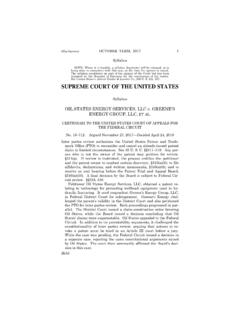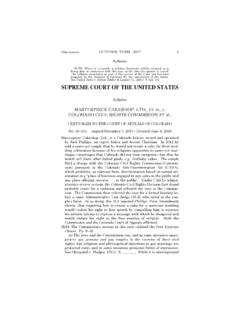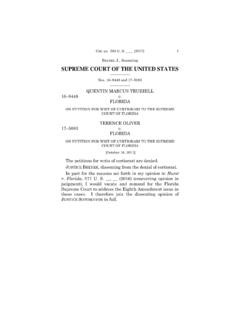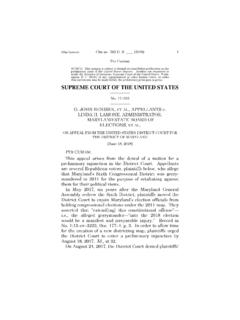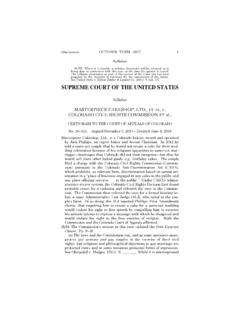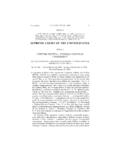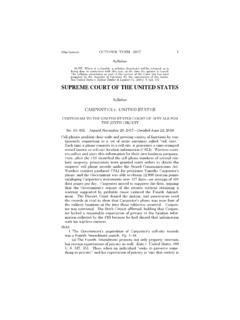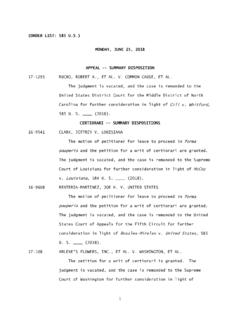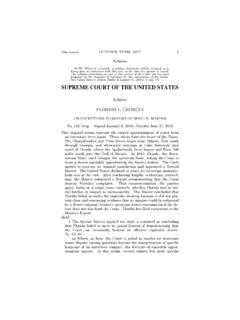Transcription of SUPREME COURT OF THE UNITED STATES
1 (Slip Opinion) OCTOBER TERM, 2014 1. Syllabus NOTE: Where it is feasible, a syllabus (headnote) will be released, as is being done in connection with this case, at the time the opinion is issued. The syllabus constitutes no part of the opinion of the COURT but has been prepared by the Reporter of Decisions for the convenience of the reader. See UNITED STATES v. Detroit Timber & Lumber Co., 200 U. S. 321, 337. SUPREME COURT OF THE UNITED STATES . Syllabus CITY AND COUNTY OF SAN FRANCISCO, CALIFORNIA, ET AL. v. SHEEHAN. CERTIORARI TO THE UNITED STATES COURT OF APPEALS FOR. THE NINTH CIRCUIT. No. 13 1412. Argued March 23, 2015 Decided May 18, 2015. Respondent Sheehan lived in a group home for individuals with mental illness. After Sheehan began acting erratically and threatened to kill her social worker, the City and County of San Francisco (San Fran- cisco) dispatched police officers Reynolds and Holder to help escort Sheehan to a facility for temporary evaluation and treatment.
2 When the officers first entered Sheehan's room, she grabbed a knife and threatened to kill them. They retreated and closed the door. Con- cerned about what Sheehan might do behind the closed door, and without considering if they could accommodate her disability, the of- ficers reentered her room. Sheehan, knife in hand, again confronted them. After pepper spray proved ineffective, the officers shot Sheehan multiple times. Sheehan later sued petitioner San Francis- co for, among other things, violating Title II of the Americans with Disabilities Act of 1990 (ADA) by arresting her without accommodat- ing her disability. See 42 U. S. C. 12132. She also sued petitioners Reynolds and Holder in their personal capacities under 42 U. S. C. 1983, claiming that they violated her Fourth Amendment rights. The District COURT granted summary judgment because it concluded that officers making an arrest are not required to determine whether their actions would comply with the ADA before protecting them- selves and others, and also that Reynolds and Holder did not violate the Constitution.
3 Vacating in part, the Ninth Circuit held that the ADA applied and that a jury must decide whether San Francisco should have accommodated Sheehan. The COURT also held that Reyn- olds and Holder are not entitled to qualified immunity because it is clearly established that, absent an objective need for immediate en- try, officers cannot forcibly enter the home of an armed, mentally ill 2 CITY AND COUNTY OF SAN FRANCISCO. v. SHEEHAN. Syllabus person who has been acting irrationally and has threatened anyone who enters. Held: 1. The question whether 12132 requires law enforcement officers to provide accommodations to an armed, violent, and mentally ill suspect in the course of bringing the suspect into custody, Pet. for Cert. i, is dismissed as improvidently granted. Certiorari was grant- ed on the understanding that San Francisco would argue that Title II. of the ADA does not apply when an officer faces an armed and dan- gerous individual.
4 Instead, San Francisco merely argues that Sheehan was not qualified for an accommodation, 12132, because she pose[d] a direct threat to the health or safety of others, which threat could not be eliminated by a modification of policies, practices or procedures, or by the provision of auxiliary aids or services, 28. CFR (a), This argument was not passed on by the COURT below. The decision to dismiss this question as improvidently granted, moreover, is reinforced by the parties' failure to address the related question whether a public entity can be vicariously liable for damages under Title II for an arrest made by its police officers. Pp. 7 10. 2. Reynolds and Holder are entitled to qualified immunity from lia- bility for the injuries suffered by Sheehan. Public officials are im- mune from suit under 42 U. S. C. 1983 unless they have violated a statutory or constitutional right that was clearly established' ' at the time of the challenged conduct, Plumhoff v.
5 Rickard, 572 U. S. ___, ___, an exacting standard that gives government officials breathing room to make reasonable but mistaken judgments, Ash- croft v. al-Kidd, 563 U. S. ___, ___. The officers did not violate the Fourth Amendment when they opened Sheehan's door the first time, and there is no doubt that they could have opened her door the sec- ond time without violating her rights had Sheehan not been disabled. Their use of force was also reasonable. The only question therefore is whether they violated the Fourth Amendment when they decided to reopen Sheehan's door rather than attempt to accommodate her dis- ability. Because any such Fourth Amendment right, even assuming it exists, was not clearly established, Reynolds and Holder are enti- tled to qualified immunity. Likewise, an alleged failure on the part of the officers to follow their training does not itself negate qualified immunity where it would otherwise be warranted.
6 Pp. 10 17. Certiorari dismissed in part; 743 F. 3d 1211, reversed in part and re- manded. ALITO, J., delivered the opinion of the COURT , in which ROBERTS, C. J., and KENNEDY, THOMAS, GINSBURG, and SOTOMAYOR, JJ., joined. SCALIA, Cite as: 575 U. S. ____ (2015) 3. Syllabus J., filed an opinion concurring in part and dissenting in part, in which KAGAN, J., joined. BREYER, J., took no part in the consideration or deci- sion of the case. Cite as: 575 U. S. ____ (2015) 1. Opinion of the COURT NOTICE: This opinion is subject to formal revision before publication in the preliminary print of the UNITED STATES Reports. Readers are requested to notify the Reporter of Decisions, SUPREME COURT of the UNITED STATES , Wash- ington, D. C. 20543, of any typographical or other formal errors, in order that corrections may be made before the preliminary print goes to press. SUPREME COURT OF THE UNITED STATES . _____. No. 13 1412. _____. CITY AND COUNTY OF SAN FRANCISCO, CALIFORNIA, ET AL.
7 , PETITIONERS v. TERESA SHEEHAN. ON WRIT OF CERTIORARI TO THE UNITED STATES COURT OF APPEALS FOR THE NINTH CIRCUIT. [May 18, 2015] JUSTICE ALITO delivered the opinion of the COURT . We granted certiorari to consider two questions relating to the manner in which San Francisco police officers ar- rested a woman who was suffering from a mental illness and had become violent. After reviewing the parties'. submissions, we dismiss the first question as improvidently granted. We decide the second question and hold that the officers are entitled to qualified immunity because they did not violate any clearly established Fourth Amendment rights. I. Petitioners are the City and County of San Francisco, California (San Francisco), and two police officers, Ser- geant Kimberly Reynolds and Officer Kathrine Holder. Respondent is Teresa Sheehan, a woman who suffers from a schizoaffective disorder. Because this case arises in a summary judgment posture, we view the facts in the light most favorable to Sheehan, the nonmoving party.
8 See, , Plumhoff v. Rickard, 572 U. S. ___, ___ ___ (2014). (slip op., at 1 2). 2 CITY AND COUNTY OF SAN FRANCISCO. v. SHEEHAN. Opinion of the COURT In August 2008, Sheehan lived in a group home for people dealing with mental illness. Although she shared common areas of the building with others, she had a pri- vate room. On August 7, Heath Hodge, a social worker who supervised the counseling staff in the building, at- tempted to visit Sheehan to conduct a welfare check. Hodge was concerned because Sheehan had stopped tak- ing her medication, no longer spoke with her psychiatrist, and reportedly was no longer changing her clothes or eating. See 743 F. 3d 1211, 1218 (CA9 2014); App. 23 24. Hodge knocked on Sheehan's door but received no an- swer. He then used a key to enter her room and found Sheehan on her bed. Initially, she would not respond to questions. But she then sprang up, reportedly yelling, Get out of here! You don't have a warrant!
9 I have a knife, and I'll kill you if I have to. Hodge left without seeing whether she actually had a knife, and Sheehan slammed the door shut behind him. See 743 F. 3d, at 1218. Sheehan, Hodge realized, required some sort of inter- vention, App. 96, but he also knew that he would need help. Hodge took steps to clear the building of other peo- ple and completed an application to have Sheehan de- tained for temporary evaluation and treatment. See Cal. Welf. & Inst. Code Ann. 5150 (West 2015 Cum. Supp.). (authorizing temporary detention of someone who as a result of a mental health disorder, is a danger to others, or to himself or herself, or gravely disabled ). On that appli- cation, Hodge checked off boxes indicating that Sheehan was a threat to others and gravely disabled, but he did not mark that she was a danger to herself. 743 F. 3d, at 1218. He telephoned the police and asked for help to take Sheehan to a secure facility.
10 Officer Holder responded to police dispatch and headed toward the group home. When she arrived, Holder re- viewed the temporary-detention application and spoke Cite as: 575 U. S. ____ (2015) 3. Opinion of the COURT with Hodge. Holder then sought assistance from Sergeant Reynolds, a more experienced officer. After Reynolds arrived and was brought up to speed, Hodge spoke with a nurse at the psychiatric emergency services unit at San Francisco General Hospital who said that the hospital would be able to admit Sheehan. Accompanied by Hodge, the officers went to Sheehan's room, knocked on her door, announced who they were, and told Sheehan that we want to help you. App. 36. When Sheehan did not answer, the officers used Hodge's key to enter the room. Sheehan reacted violently. She grabbed a kitchen knife with an approximately 5-inch blade and began approaching the officers, yelling something along the lines of I am going to kill you.
